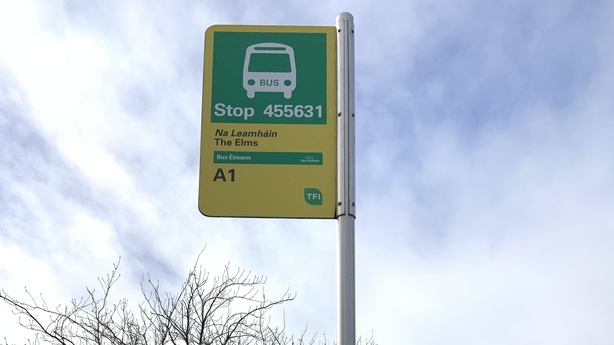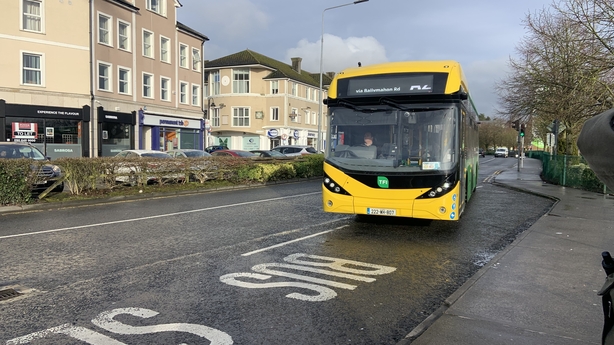Bus Éireann is set to use findings from its first electric town bus service in Athlone to launch its first electric regional city service in Limerick before Easter.
It comes as the Athlone pilot project has passed the one-year mark.
Last January, 11 electric buses were launched in the midlands town by Bus Éireann, with a €10 million investment by the National Transport Authority.
Bus Éireann said that during the first year of service the 11 electric vehicles completed over 530,000 emission-free kilometres eliminating more than 400,000kg of tailpipe CO2 emissions when compared to traditional vehicles.
The company said it has also seen passenger growth of 25% in 2023 compared to the same period in 2022.
However there had been criticism of the town service across the winter months and cold weather, with local complaints of the buses being cold and unreliable.
Bus Éireann Chief Executive Stephen Kent said as it is a Pathfinder project, there is lots to learn overall in relation to everything about performance.
"For us it was about running through it and having the full year of different temperatures, different regimes, so that meant we had to continue to manage the scheduling of the vehicles, understanding the range of the vehicles and continuing to adapt it," he said.

"Certainly, in the cold weather recently we discovered that obviously the vehicle consumes more energy so you have to redeploy to a certain extent and understand the range might be less and have other vehicles to put in place," he said.
"These are all part of the collective learnings that we're going to use to inform the next roll-out which is going to come in Limerick before the Easter."
Some of the key findings, he said, relate to customer and staff satisfaction as well as how to manage the performance of the vehicles.
"We know that the customers now appreciate the cleaner, quieter ride. We’ve had huge collaboration with all the manufacturers to deliver a project like this. We understand scheduling much better in the vehicles, and we understand range in the vehicles," he said.
He added: "For our drivers it’s a different driving experience and the mechanics in our garages had to be reskilled in relation to electric technologies."
Nine Heliox 150kw charges supplied by ESB SES are installed and operating at the Athlone depot.
Mr Kent said the ESB is continuing to diversify their energy sources and they could see even recently that there was less dependency on fossil fuels, moving into wind, solar and hydro.
"Wind in the last month has been a much bigger factor in terms of their renewable energy and I'd say that’s set to continue."
Independent TD Michael Fitzmaurice has criticised the cost of running the service, saying they cost twice the price of diesel buses to run with high charging infrastructure costs.
He has recommended the use of hydrogenated vegetable oil (HVO) as an alternative to diesel and petrol which would cut emissions by 90%.
Bus Éireann said the cost effectiveness of electric buses will become more demonstrable over time, while cost comparisons should also take into account the general upward trend in fuel prices and the further development of renewable energy sources.
Mr Kent acknowledged that as a transformative project there is a capital outlay but said their goal is to try to address climate action.
"Reducing our emissions is the overall prize and that’s what we’re chasing at the minute. In terms of the cost comparison, I think we’re going to have to wait a little longer on that because you have to take a number of things into account across the term and the lifetime of the vehicle itself."

The distinctive bright green and yellow buses have appealed to users who said they are clean and comfortable, but many complained the service is unreliable.
"It’s very good for the environment, I think it’s a great initiative. Sometimes it could work on time improvement, but otherwise it’s a great service," said Aoife Carrol.
Another woman living in the town for the past year, Leona, praised their cleanliness.
"The bus is clean, and the drivers are polite and good. But the schedule of the buses is not good. Sometimes we have to wait a long time at the bus stop and no bus comes along. With the Irish weather, it’s not comfortable to be waiting a long time for the bus to come," she said.
Kathleen Chiaramonte agrees. "They’re grand, very comfortable. But we have to wait sometimes, quite a lengthy time for the buses to come, some of them, that’s the only thing."
Another local Catherine Shine recommended using the app to figure out when the bus is due. "I use them a lot, they were very reliable but with the roadworks it knocked it all out of sync, hopefully it will go back to normal, but if people use the app its fairly accurate."
Bus Éireann said that in January 2024 punctuality for the Athlone routes improved by approximately 14% when compared to the average punctuality for 2023.
As this is a Pathfinder project, new discoveries about the technology have also emerged over the course of the year, according to Regional Engineering Manager with Bus Éireann Tom McHale.
"Of course there are always challenges, this is new technology and people have worked with diesel engines for the last 30, 40, 50 years so it is a change in mindset, but overall staff are very happy with the work they have to do on these buses," he said.
He added: "Interestingly what we’ve learned is that we are getting back about 30% of the power that’s coming back through the brakes through the regenerative charging.
"That was an unknown that we didn’t take into account at the start. So, we are learning lots on the technical aspects of the project."
Bus Éireann is now preparing to launch the first phase of the electrification of its Limerick city bus fleet and depot before Easter 2024.
Thirty-four electric buses will initially enter the service, while drivers and staff are currently undergoing testing and training.
In collaboration with the NTA, it plans to introduce electric buses to all regional cities and designated towns over the coming years.
Mr McHale said a lot of factors will impact on when exactly electric fleets can be rolled out everywhere.
"A lot of that is going to be dictated by the market, it’s going to be dictated by the electricity supply, you know all over Europe getting enough power in order to power transport is going to be a challenge, so it will take some time.
"We’ll also have the European Regulations which will drive some of these dates for when full electrification will be achieved. But overall, within Bus Éireann we are aiming towards zero carbon emissions by 2050 in line with Government policy."







